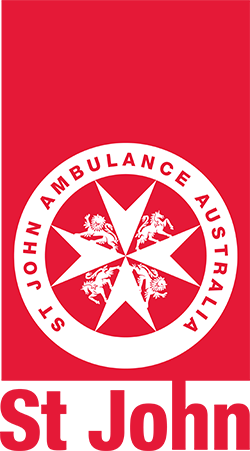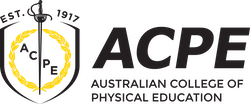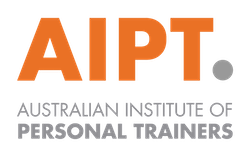In this post
- How to become a counsellor in Australia
- Study relevant counselling qualifications
- Getting professional counselling accreditation in Australia
- Starting your counselling career
- Considering whether a counselling job is for you
- What does a counsellor do?
- How much does a counsellor earn?
- Counselling skills that you need to succeed
- Browse Counselling Results
How to Become a Counsellor in Australia 2024: the Ins and Outs of This Fulfilling Role
In this post Show
- How to become a counsellor in Australia
- Study relevant counselling qualifications
- Getting professional counselling accreditation in Australia
- Starting your counselling career
- Considering whether a counselling job is for you
- What does a counsellor do?
- How much does a counsellor earn?
- Counselling skills that you need to succeed
- Browse Counselling Results
A career in counselling is suited to people who want to support the mental health and wellbeing of others and make a positive difference in people’s lives. Passionate and empathetic counsellors feel rewarded when they see clients tackle challenges in their lives. Counselling in Australia is a much-needed profession that offers strong, well-paying, and flexible employment prospects.
If you’ve been asking yourself: “How do I become a counsellor?” This article has all the answers. From what skills you need, what to study, and what to expect from the counselling industry.
How to become a counsellor in Australia
- Get qualified with a Diploma of Counselling (CHC51015)
- Get professional accreditation by registering with the Australian Counselling Association (ACA) or the Psychotherapy and Counselling Federation of Australia (PACFA)
- Choose an organisation or sector to work in and apply for jobs
Counsellor job description
Counsellors work with clients for short periods of time to help them reflect on and address practical and immediate issues in their lives. These problems could include grief, making difficult transitions (such as a divorce or the birth of a new baby), relationship or career issues, poor self-esteem, and more.
During counselling sessions, counsellors encourage clients to draw and build on their own insights and skills to solve these issues and return to a better state of emotional wellbeing.
Study relevant counselling qualifications
In Australia, counselling is not a regulated profession, meaning that there are no particular qualifications or accreditations required to become a counsellor. Although some states (including NSW, VIC, QLD and SA) do require that counsellors abide by a code of practice, which is provided by the Australian Counselling Association (ACA).
That said, studying counselling in Australia is an important step towards becoming a professional in the field. A career in counselling is not the role to dive blindly into. Counsellors are responsible for the wellbeing of their clients (as well as their own wellbeing). If they’re underprepared for the job then they will not be capable of looking after their clients or themselves responsibly.
A qualification shows prospective clients and employers that you understand what the job entails, and how to do it effectively and ethically. Courses will also give you practical experience while you’re still learning, so you’ll be fully prepared for the workforce upon completion.
Which counselling course is right for you?
There are many different study options available for those wanting to pursue counselling, all at different qualification levels. Before studying counselling, it is important to know which course is right for you.
A popular counselling certification is a one-year Diploma of Counselling (CHC51015) which can be studied at a TAFE or other vocational training provider. This counselling qualification is required for professional accreditation and to start your own accredited counselling practice.
However, many advertised counselling jobs require a three-year undergraduate degree such as a Bachelor of Counselling, or a Bachelor of Community Services with a counselling major. Postgraduate qualifications such as a graduate diploma or a masters degree are available for those with existing qualifications.
Ongoing professional development is also recommended throughout your career so you are always up to date with the latest skills and code of practice.
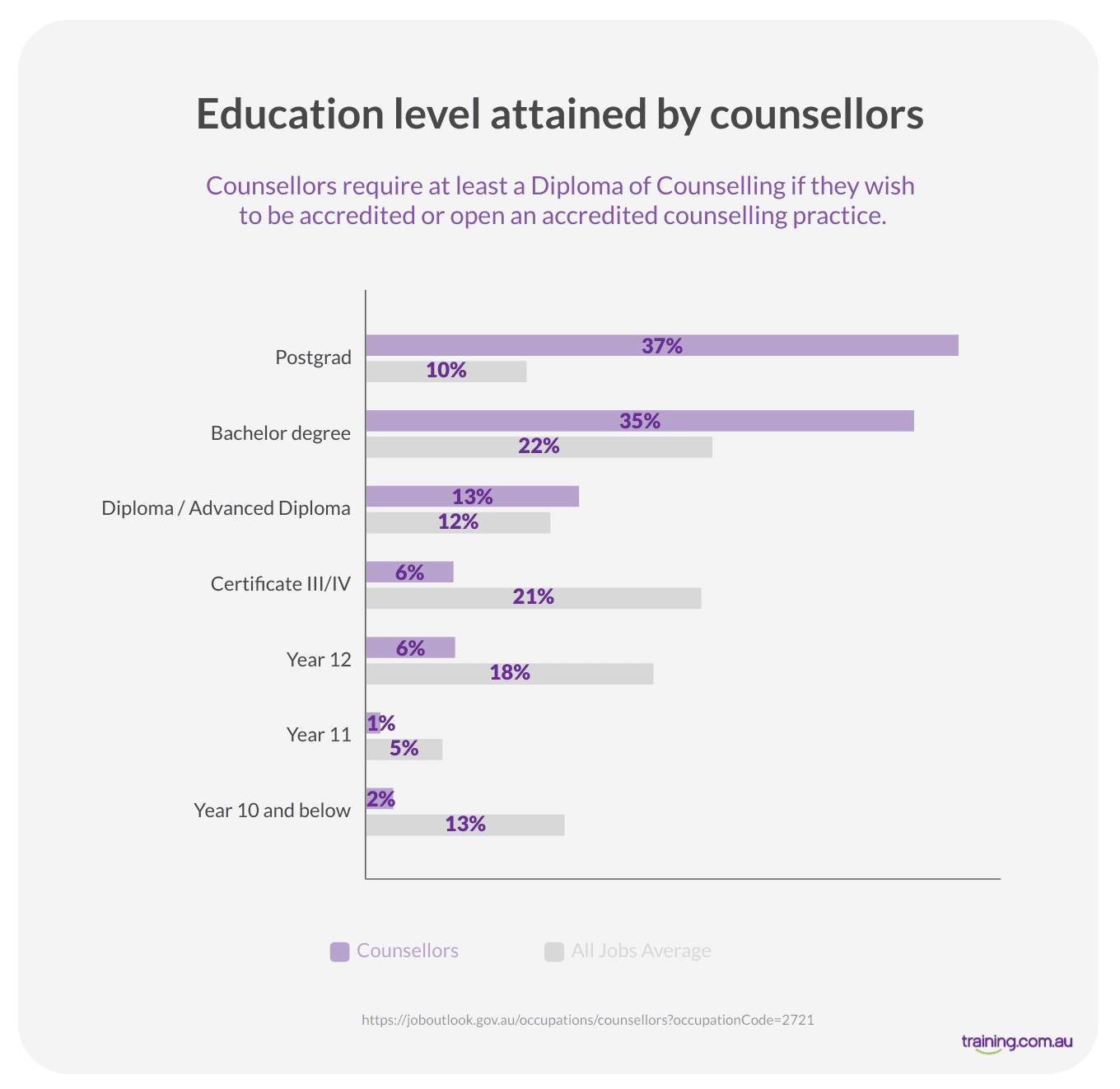
Getting professional counselling accreditation in Australia
As counselling is an unregulated field, counsellors don’t technically need accreditation to practice as a professional counsellor. However, it’s a good idea to become a member of a professional counselling group such as the Australian Counselling Association (ACA) or the Psychotherapy and Counselling Federation of Australia (PACFA) which accredits counsellors and psychotherapists.
Accreditation is well-regarded in the field. It will improve your employment opportunities and your reputability, along with offering you affordable professional insurance, and further education and training.
Starting your counselling career
Once you’re an accredited and qualified counsellor, you can seek counselling careers in a diverse array of organisations and industries, such as:
- Schools and universities
- Workplaces
- Community healthcare centres
- In-patient settings
- Welfare agencies
- Aged care settings
- Palliative care settings
- Settlement services for refugees
- Crisis phone lines
Many counsellors also work in private practice, either on their own or as part of a practice team. Counsellors working in private practice are self-employed and offer services to members of the general public.
5 Types of Counselling Jobs | The Essential Guide
Counselling is an important profession in supporting Australia’s wellbeing. It also provides well-paying, flexible job opportunities, with plenty of existing and expected future demand for counsellors through a diverse range of settings. Learn more about five types of counselling jobs.
Considering whether a counselling job is for you
Nobody can be a perfect counsellor without some experience and training in counselling skills and conflict resolution. It’s worth thinking about whether the job appeals to you and builds on your natural talents and temperament.
Should I become a counsellor or a psychologist? Read all about the two different fields, qualifications and nitty-gritty details.
What does a counsellor do?
So, what does a counsellor do in their day to day job? It’s a role that typically varies and you’ll find no two days are the same. But there are some common counselling responsibilities you can expect to undertake:
- Talking to clients one-on-one about the issues they’re facing, employing empathy and sensitivity.
- Offering mediation or discussion opportunities for groups of clients, such as in family or couples therapy, or in facilitating support groups.
- Offering specific types of therapies such as cognitive behavioural therapy (CBT).
- Working with health professionals and other community service workers to assist with patient treatment plans.
- If you’re self-employed, duties related to running your own business such as marketing, invoicing, maintaining a counselling room, and responding to enquiries.
- Services offered by counsellors tend to be time-limited to a specific number of weeks or sessions.
Counsellors can have a range of different specialisations such as:
- Mental illness counselling and case management
- Alcohol and/or substance abuse counselling
- Trauma counselling
- Family or relationship counselling, and conflict resolution
- Being a university or school counsellor for young people
- Rehabilitation counselling – working with clients in healthcare settings after they’ve been impacted by an injury or health condition.
How much does a counsellor earn?
According to Labour Market Insights (previously known as Job Outlook), full-time counsellors make on average $1,652 per week, which is a little over the average national wage. A counsellor’s salary will grow over time as they gain more experience.
Counsellor salary varies depending on the position and field the counsellor works in. Some of the highest paying counselling fields are:
- Genetic counselling
- Family and relationship counselling
- Substance abuse counselling
- Mental health counselling
- Guidance counselling
- Financial counselling
There is very strong expected future jobs growth in the industry as more funding is invested into supporting the population’s mental health. Counselling is also a good profession for people looking to maintain work/life balance – 49% of counsellors work part-time or casual.
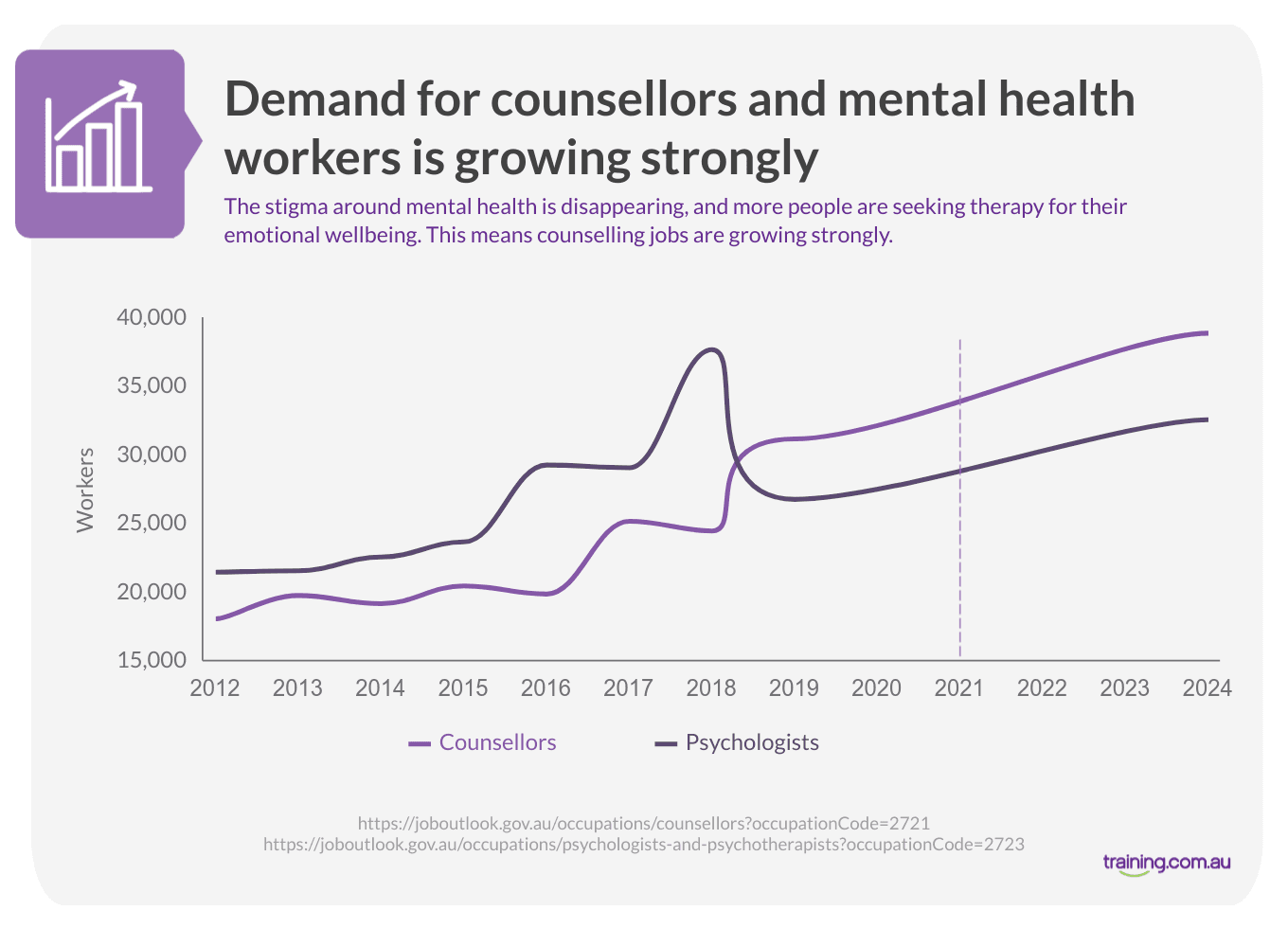
$1,652
AVERAGE FULL-TIME COUNSELLOR WAGE (PER WEEK)
49%
OF COUNSELLORS WORK PART TIME OR CASUAL
Counselling skills that you need to succeed
Counsellors require certain skills and traits to thrive in what can be a challenging environment. Caring people tend to innately have the soft skills required to become a counsellor already, which makes them great for the role.
Counselling skills you may already have are:
Empathy, open-mindedness, and compassion
Caring about your clients, understanding their point of view, and allowing them to share whatever is on their mind without fear are key ways counsellors meaningfully relate to clients and build trust and rapport.
Communication skills
Counsellors need to be clear, sensitive communicators who build meaningful relationships. It’s important to choose your words carefully, especially when working with vulnerable populations. Strong communication also involves nonverbal communication skills, such as positive body language and having a calm, professional tone.
Patience and tenacity
Sometimes clients require a long time to make positive changes in their life. Counsellors need to keep supporting them, and not let frustration or burn out impact their relationship with their client.
Professionalism
Although counsellors need to be empathetic and draw on their own life experience, they need to maintain professional boundaries so they’re not sharing excessive information about themselves with clients, or taking their work home at the end of the day. They’ll have a self-care practice and will be prepared to ask others – such as a supervisor – for advice, or to debrief on difficult sessions. They’re also committed to upholding the legal and ethical responsibilities of a counsellor, ensuring their conduct is always appropriate and constructive.
Counselling is a rewarding and fulfilling career that positively impacts other people’s lives. Does counselling sound like it could be the career for you? Find out seven things professional counsellor, Amber Rules, wishes she knew before entering the field, or read the comprehensive guide on how to become a counsellor in Australia.
7 Things I Wish I Knew Before Becoming a Counsellor
Gain insights about this challenging yet rewarding field from professional counsellor Amber Rules.
Becoming a Counsellor in Australia: Your One-Stop Guide
Discover a resource library that can take you from A to B on your journey to becoming a counsellor. From figuring out what specialisation to choose, to insights from professional counsellors, this guide has everything you need.
Browse Counselling Results
Certificate III in Individual Support (Disability) (VIC Only, excl. Metro) CHC33021
Certificate III in Individual Support (CHC33021) qualification reflects the role of workers in the community and/or residential setting who follow an individualised plan to provide person-centred support to people who may require support due to ageing,...
Certificate IV in Ageing Support (VIC Only, excl. Metro) CHC43015
Certificate IV in Ageing Support (CHC43015) reflects the role of support workers who complete specialised tasks and functions in aged services; either in residential, home or community based environments. Workers will take responsibility for their own...
Diploma of Leisure and Health (VIC Only, excl. Metro) CHC53415
Diploma of Leisure and Health (CHC53415) reflects the role of workers with responsibility for designing, implementing and evaluating health and leisure activities, and programs for clients in one or more sector areas. Work may be in residential facilit...
Certificate IV in Mental Health Peer Work (VIC Only, excl. Metro) CHC43515
CHC43515 – Certificate IV in Mental Health Peer Work qualification reflects the role of workers who have lived experience of mental illness as either a consumer or carer and who work in mental health services in roles that support consumer peers or car...
Certificate III in Early Childhood Education and Care (VIC Only, excl. Metro) CHC30121
This qualification reflects the role of educators in early childhood education and care who work in regulated children’s education and care services in Australia. They support children’s wellbeing and development in the context of an approved learning...
Diploma of Early Childhood Education and Care (VIC Only, excl. Metro) CHC50121
The Diploma of Early Childhood Education and Care qualification reflects the role of educators in early childhood education and care who work in regulated children’s education and care services in Australia. Educators at this level are responsible for...
Diploma of Emergency Health Care (VIC Only) HLT51020
This qualification starts you on the pathway for a role as an Ambulance Transport Attendant, providing non-emergency transport and care for patients who have a low or medium acuity or chronic illness or disability and require transportation. You will g...
Certificate III and Certificate IV in Allied Health Assistance HLT33021, HLT40321
Turn your passion for helping people into a career in Allied Health Assisting. If you’re ready to advance your career in healthcare support, the HLT33021 Certificate III in Allied Health Assistance and HLT40321 Certificate IV in Allied Health Assistanc...
Bachelor of Education (Physical & Health Education) (NSW Only)
If you’re keen to pursue a career in physical and health education, the Bachelor of Education (Physical and Health Education) will provide you with the graduate qualification to become a PDHPE teacher. Based on the Graduate Outcome Survey 2021, ACPE wa...
Psychology & Mental Health Essentials
Explore the fascinating psychology behind our brains, bodies and behaviours and learn new ways to improve mental health and wellbeing. Learn directly from Australia’s leading counsellors, psychologists and health coaches. Discover the complex inner wor...
Certificate IV in Building & Construction (Building) CPC40120
CAL’s Certificate IV in Building and Construction (Building) will kickstart your pathway towards becoming a licences builder by developing your knowledge of key project planning activities, risk management, estimating and contract admin, and legal requ...
Alcohol & Other Drugs Short Course
This Alcohol & Other Drug Course is designed to provide aspiring professionals and those seeking professional development with a foundational skillset and knowledge in alcohol & other drugs. This introductory course comprises 8 units from our n...
Mental Health Short Course
This Mental Health Course is designed to provide aspiring professionals and those seeking professional development with a foundational skillset and knowledge in mental health. This introductory course comprises 8 units from our nationally recognised (C...
Certificate III in Sport, Aquatics and Recreation SIS30122
The SIS30122 Certificate III in Sport, Aquatics and Recreation will equip you with the tools and knowledge you need to take on operational and customer support positions in the sport or community recreation industry. This hands-on qualification will eq...
Diploma of Early Childhood Education and Care (QLD Only) CHC50121
Do you have a passion for educating and shaping young minds? Then consider a Diploma of Early Childhood Education and Care. Learn the skills to plan, implement and manage programs in early childhood services, in accordance with licensing, accreditation...
Certificate IV in Community Services (Perth Only) CHC42021
The Certificate IV in Community Services is designed for those looking to advance in community service roles. This qualification equips you to support person-centred services to individuals and groups. As a community service worker, you will provide ad...
Certificate II in EAL (Access) (VIC ONLY) 22251VIC
This nationally recognised course people from non-English speaking backgrounds the chance to improve their written and spoken English skills. Join a diverse group of friendly classmates from many backgrounds, all with a passion to improve their reading...
Certificate III & IV in Fitness SIS30321/SIS4022
If you’re looking for a new career and want to help people achieve their health and fitness goals, then the combined Cert III and IV in Fitness is the course you need. As a qualified Personal Trainer, you’ll be able to work with a wide variety of clie...
Diploma of Sport SIS50321
The Diploma of Sport is geared towards fitness professionals, who are looking to take the next step in their career. At Fit Education we’ll connect you to many of Australia’s top sports performance experts. Together these professionals offer a unique...
Certificate IV in Allied Health Assistance (Nutrition and Dietetic Support) HLT43021
Our Certificate IV in Allied Health Assistance (Nutrition and Dietetic Support) will equip you with the practical skills and knowledge to support Dietitians and Nutritionists in improving patient wellbeing through tailored nutritional programs. With th...
Online courses also available
Latest Articles
How to Apply for Work Placement: Tips & Resources
Congratulations! You’re about to embark on an exciting journey where you will practise and develop t...
11 Hobbies That Can Make You Money: Use Your Passion for Profit
Hobbies often get a bad rap. They’re seen as just a way to kill time, a mindless escape from t...
Is The Job You Hate Killing You? Why You Need to Make a Change
Do you hate your job? Studies show that staying in a job you hate has negative health effects and ev...


